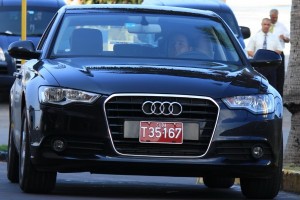Cubanet.org, Iris Lourdes Gomez Garcia, 4 September 2015 – Felipe promised himself that this was going to be his year. He was tired of the buses, after so many years of heat, lines, bad smells, pickpockets and arguments, it was time to do something.
Since he could not aspire to anything else, he began by buying a bicycle. The simplest, the cheapest. Although he arrived everywhere in a sweat, it did not matter, because he had left behind everything described in the foregoing paragraph. Now he only depended on himself, his health and his strength.
After some time, he thought again that it was time to improve; after all – according to him – the success of a man is measured by his means of transportation. In due time, he could aspire to the greatest: a Mercedes Benz or a special Audi, but to get to that point, he would have to go step by step. continue reading
As his next step he decided to put a motor on the bicycle in order to avoid pedaling and sweating and to increase speed. They sold him one, with papers and everything, which had belonged to exterminators but which had been dropped from the center to which it had belonged. Cautiously, he asked several “ponies” (traffic cops) if that motor had problems, and after several negative replies from the officers, he bought it.
Once the motor was in place, the bike became a “riquimbili” which is what bicycles are called when they are propelled by gasoline. The transit police stopped him several times, and that was how he found out that there is a police unit, located at 21 and C in Vedado, that specialized in riguimbilis. He found out that in order to avoid pedaling he should have bought a motor whose papers expressly said “bicycle motor” because otherwise they took one and then another from him, and eventually they fined him. He also found out in the same police unit that there was a complaint against him by someone on his own block who was bothered by the sound of his means of transportation when he came and went.
From all that he learned about the transportation laws, buying and informers, what worried him most was the complaint the neighbor lodged against him because he was only beginning his road to success and for the moment the only thing he had achieved in life was transportation without sweat, without fighting with anyone, without having his pocket picked or smelling other people’s bad odors.
His worry was turning into horror because, if his neighbors out of envy complained to the police about him because of an old bicycle and crappy motor, stinky and loud, what would happen when he had a Peugeot or any useful car? Maybe these neighbors were capable even of hiring someone to damage it in some way: puncturing the tires, scratching the paint, implicating him in an accident. If they would file a complaint on him because of a riquimbili, then they would kill him when he had his Audi.
Felipe decided that it was not worth losing his life for a job in which they pay very little, and he resigned himself to continue – as he had done since he was born – transporting himself in the way that he was most familiar and that no one envies: the buses.
Translated by Mary Lou Keel

